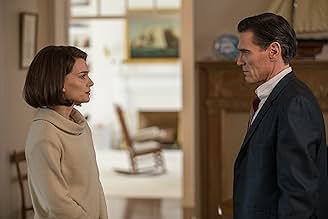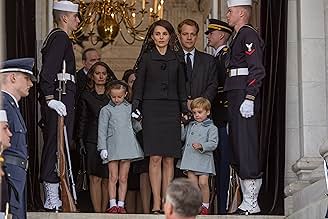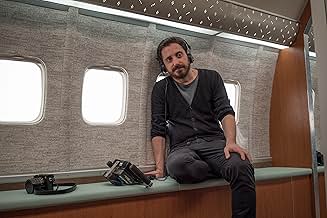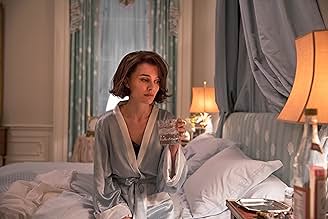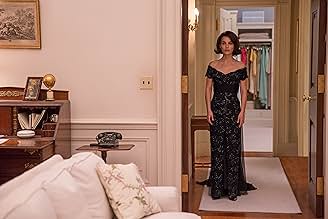Après l'assassinat du président John F. Kennedy, la première dame Jacqueline Kennedy lutte contre le chagrin et le choc de sa mort : elle retrouve sa foi, console ses enfants et cherche à co... Tout lireAprès l'assassinat du président John F. Kennedy, la première dame Jacqueline Kennedy lutte contre le chagrin et le choc de sa mort : elle retrouve sa foi, console ses enfants et cherche à comprendre l'importance historique de son mari.Après l'assassinat du président John F. Kennedy, la première dame Jacqueline Kennedy lutte contre le chagrin et le choc de sa mort : elle retrouve sa foi, console ses enfants et cherche à comprendre l'importance historique de son mari.
- Nommé pour 3 oscars
- 44 victoires et 170 nominations au total
Avis en vedette
The scene ideas are painfully simple, though highly effective. From sharing the impossible news with her kids, to deciding when/how to move out, to asking million-dollar questions of the priest ("What kind of God takes a father away from his two little children?"), the movie includes moments we all know must have happened to Jackie but were buried under the public hysteria around the event itself. As intoned by the funeral planner, "The world's gone mad."
Jackie makes small talk in the hearse with Bobby Kennedy while her dead husband (his dead brother... America's dead president) lies in the hulking casket between them, causing our focus to oscillate between the weight of what we hear and what we see. Later, as she staggers through the White House at the end of the longest day of her life - still donning her blood-soaked pink dress that would soon find a permanent home in infamy - Jackie personifies crippling isolation in body and in mind. The non sequiturs that tumble out during these dreadful sequences ("How will we afford to put the kids through school now? Maybe we can sell some of the furniture?") are as heartfelt as they are ludicrous. No matter where she is or what she's doing, Jackie reacts like any commoner would. She just happens to be doing so as the First Lady.
The film works because Portman is the most believable Jackie O ever put on screen. From the outset, she is in total control of her confusion, fear, helplessness, exasperation, guilt, long-held duties as a mother, brand-new duties as a *father, alongside her esoteric responsibilities to the nation. Portman puts on an acting clinic by conveying her predicament through nuance. We learn as much about Jackie's state of mind from what she doesn't say as from what she does, because no matter how carefully she speaks or how badly she wishes to be understood, it becomes clear that no words could ever meet the moment.
Characters often stare pleadingly into the camera's eyebrow, as if searching for an escape hatch from the audience. The score is populated by discordant whole notes that produce similar unease. Even the photography is at once stunning and unsettling, given the underlying darkness that has eclipsed the light of society. In the end, we feel the world on edge, suspended in time, waiting for normal life to resume. This film concerns the looking back required before it is possible for Jackie Kennedy (or for any of us) to make sense of the loss and start again. The same looking back required "to let them see what they've done."
Okay, several people were angry that John-John in the movie didn't salute the casket.
One review referred to the story as "horrible and morbid." Guess what - it is.
One review said Jackie was a "housewife." I won't dignify that with a response.
Natalie Portman was criticized for doing a "cringe-worthy" imitation. Her voice and accent were found hilarious.
And it was called "boring" over and over again.
I understand that to each his own, and I respect that. I'm just surprised.
I first of all did not find this film at all boring. I found it emotional, compelling, and interesting - and despite what someone said here, I did find out things I never knew.
I thought Natalie Portman did a brilliant job and, while the role didn't offer as much as Viola Davis' did in Fences, I would not have been upset to see her win another Oscar. There was nothing wrong with her accent, that's how Mrs. Kennedy talked. If you don't believe me, go to youtube and listen to the tapes.
The film focused on Jackie after the assassination, but it was shown, as were earlier times, such as her televised tour of the White House. I thought the film mixed with the actual footage was excellent.
The clothes were perfection. Like others, I did not care for the music and what I really did not care for was the music at the end.
The rest of the cast did an admirable job - John Hurt, Greta Gerwig, and Billy Crudup. I was disappointed in Peter Sarsgaard, but I think he was trying to convey Bobby's shock and grief. He's a good actor normally but not very successful here.
I found this a poignant film and a stunning portrait of Jackie Kennedy and what she suffered as a result of the assassination.
Essentially this is a film where I liked everything, but didn't love much. The only things that I absolutely loved was Natalie Portman's acting as Jackie Kennedy. She really exuded her character and became Jackie Kennedy. it was great! The other thing I loved was John Hurt as the priest which was a lovely surprise.
Overall, this was a simple film but it wasn't daring. It didn't risk take like other films would and therefore in that regard may be a bore for some.
Le saviez-vous
- AnecdotesAfter Natalie Portman was cast, to Pablo Larraín's wishes, he asked screenwriter Noah Oppenheim to tear out any pages of the script that didn't contain scenes with Jackie Kennedy, as he wanted this movie to be entirely about her and her experiences. The 120-page script was trimmed to one hundred pages, all containing Jackie.
- GaffesJackie has the list of funeral attendants read out to her, including "Crown Prince George" of Denmark. Denmark at the time did have a Prince George, but he wasn't Crown Prince. Rather they had a Crown Princess, the later Queen Margrethe. And the only Danish dignitary who attended the funeral was the Prime Minister, Jens Otto Krag.
- Citations
The Priest: There comes a time in man's search for meaning when he realises that there are no answers. And when you come to the horrible and unavoidable realization, you accept it or you kill yourself. Or you simply stop searching.
- ConnexionsFeatured in WatchMojo: Top 10 Movies of 2016 Already Getting Oscar Buzz (2016)
- Bandes originalesAffection No. 3
Composed by Paul Zaza (as Peter Dufferin)
Published by Parry Music
Courtesy of Latin Music Publishing, Inc.
Meilleurs choix
- How long is Jackie?Propulsé par Alexa
Détails
- Date de sortie
- Pays d’origine
- Sites officiels
- Langues
- Aussi connu sous le nom de
- Jackie: De Nhat Phu Nhan
- Lieux de tournage
- sociétés de production
- Consultez plus de crédits d'entreprise sur IMDbPro
Box-office
- Budget
- 9 000 000 $ US (estimation)
- Brut – États-Unis et Canada
- 13 960 394 $ US
- Fin de semaine d'ouverture – États-Unis et Canada
- 278 715 $ US
- 4 déc. 2016
- Brut – à l'échelle mondiale
- 29 778 202 $ US
- Durée1 heure 40 minutes
- Couleur
- Rapport de forme
- 1.66 : 1
Contribuer à cette page








